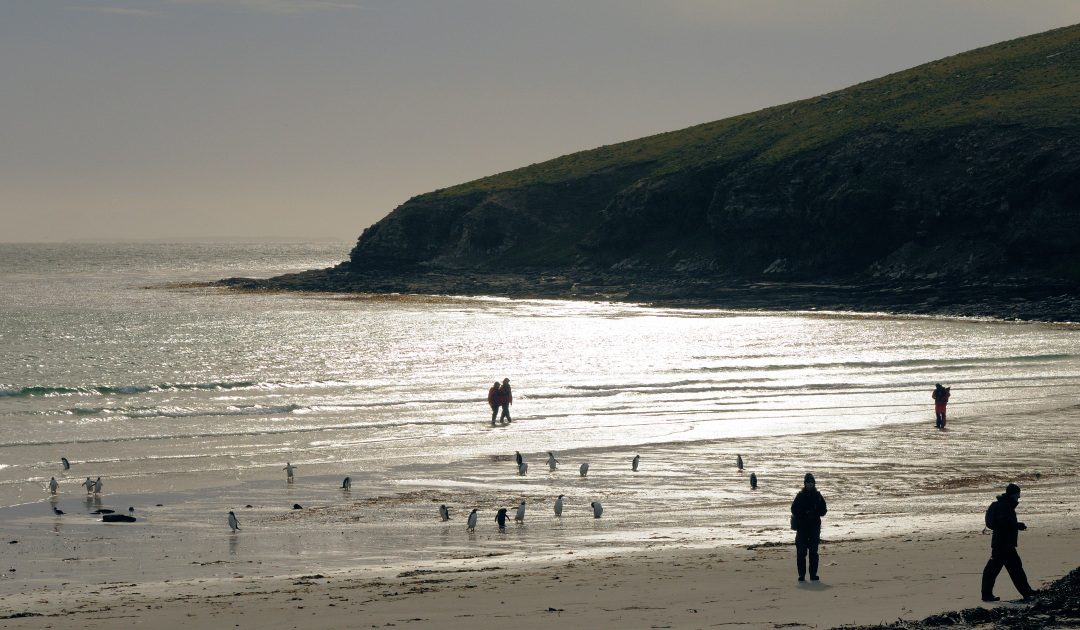
When Argentina unexpectedly occupied the Falkland Islands in 1982, the then military leadership in Buenos Aires actually thought that Britain would not adopt a military solution. But the government in London went on a full confrontational course, and Argentina laid out thousands of landmines to protect from an invasion, especially on the beaches. After the end of the conflict, they remained closed until the danger was eliminated. Now the company responsible for the sweeping has cleaned all areas and only one mine remains. It is due to be blown up at an official ceremony on Saturday.
After 38 years, the last mine at Gypsy Cove, near Stanley, is to be blown up by a raffle winner. After that, a second lucky fellow is allowed to officially cut the wire and thus officially open the last beach to the public. A cricket match and a football match on the beach will be held as a typical British manner. Those who prefer to observe this blast from the water can also do so, as the Port Authority has announced. In the evening, a celebration should conclude the celebration day. This is the plan of the Falklands government to celebrate this historic moment accordingly. Interestingly, however, the authorities issued a warning for beach visitors for Saturday: To take care of the penguins and to ensure the distance to the buildings and the animals.

“This is a huge achievement for the Islands and we must pay tribute to the brilliant team of deminers.”
Wendy Morton, Minister for European Neighbourhood and America
The British Government is also thrilled by the news that its overseas territory is finally freed from the plague of landmines. In 1997, the United Kingdom signed the Ottawa Convention. This prohibits the use, collection, production and transfer of anti-person mines. The Minister for European Neighbourhood and America Wendy Morton told the press: “This is a huge achievement for the Islands and we must pay tribute to the brilliant team of deminers who put their lives at risk day to day removing and destroying landmines to make the Falklands safe.”
“For Argentina, this process should have done jointly.”
Daniel Filmus, Argentine Minister for the Malvinas, Antarctica and South Atlantic
On the other hand, through Daniel Filmus, the Minister for the Malvinas, Antarctic territories and the South Atlantic, Argentina has publicly criticised the UK’s single-handedness on the issue of mines. This problem should have been solved jointly. After all, the problem had been presented jointly to the Ottawa Convention Panel. However, Argentina has now proposed to the British Government that a joint presentation on mine clearance be held at the next Conference of the Convention States, so that Argentina would also be confirmed to have complied with its commitment to the Ottawa Convention. But there has been no response from London so far, the minister complains. “Argentina aspires that the final presentation can be done jointly, and this way comply with the humanitarian purpose of the demining”, and at the same time “UK listens to the UN resolution and the call from most countries of the world to resume sovereignty negotiations,” Minister Filmus said.

In fact, the program ended on October 10th with the finding of the last mine. But in order to be able to celebrate the historic moment accordingly, a month of preparations was now spent. And that was no problem, because the Falkland Islands had to wait more than 38 years for this moment. It was not until 2009 that the specialist company SafeLane Global had began the sweeping. A team from Zimbabwe was deployed. CEO Adam Ainsworth said: “As a company we could not be more proud of our deminers who have risked their lives to rid the Falkland Islands of this explosive threat. We will also remain forever grateful to the people to the Falkland Islands for welcoming us and looking after us for the 11 long years it has taken to safely remove over 20,000 mines.”

The conflict over the Falkland Islands, which was fought by armed means in 1982, has long simmered between Argentina and the United Kingdom. But before the invasion on April 2, 1982, it was purely rhetorical. Yet, the Argentine attack allowed the British government to pay more attention to the islands in the South Atlantic, liberation became a matter for the chief and ensured Margaret Thatcher’s political survival while accelerating the overthrow of the military junta in Argentina. Between the fronts stood and still stand the approximately 2,700 inhabitants of the archipelago, who see June 14, 1982, Liberation Day, as the most important date in their calendar. Perhaps November 14 2020 will be at least as important.

Dr Michael Wenger, PolarJournal
More on the subject:





